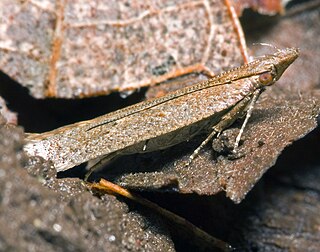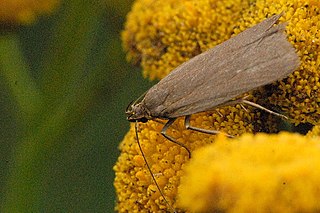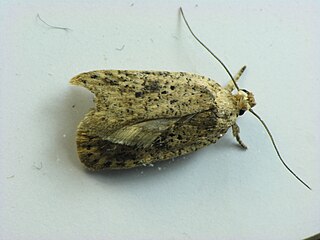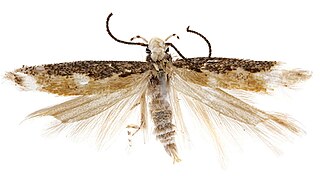Related Research Articles

The Gelechiidae are a family of moths commonly referred to as twirler moths or gelechiid moths. They are the namesake family of the huge and little-studied superfamily Gelechioidea, and the family's taxonomy has been subject to considerable dispute. These are generally very small moths with narrow, fringed wings. The larvae of most species feed internally on various parts of their host plants, sometimes causing galls. Douglas-fir (Pseudotsuga) is a host plant common to many species of the family, particularly of the genus Chionodes, which as a result is more diverse in North America than usual for Gelechioidea.

Phthorimaea operculella, also known as the potato tuber moth or tobacco splitworm, is a moth of the family Gelechiidae. It is an oligophagous insect that feeds on the plant family Solanaceae and is especially known for being a major pest of potato crops. Currently farmers utilize insecticides, parasites, and sprinkler irrigation in order to prevent P. operculella from infesting their croplands.

Chrysoesthia drurella is a moth from the family Gelechiidae. In is found in most of Europe, Russia and North America.

Scrobipalpa acuminatella is a moth of the family Gelechiidae. It is found in most of Europe, as well as Turkey, southern Siberia, Central Asia and China (Anhui). It was recently reported from Canada, with records from Ontario and Québec.

Caryocolum blandella is a moth of the family Gelechiidae. It is found from central and northern Europe to the Ural Mountains and southern Siberia.

Athrips mouffetella is a moth of the family Gelechiidae. It is found from central and northern Europe to the Ural Mountains, Siberia and the Russian Far East. It has also been recorded from North America.

Recurvaria leucatella is a moth of the family Gelechiidae. It is found in most of Europe, Turkey, Central Asia and the Caucasus.

Bryotropha terrella is a moth of the family Gelechiidae. It is the type species of the genus Bryotropha. It is found in Europe.

Depressariidae is a family of moths. It has formerly been treated as a subfamily of Gelechiidae, but is now recognised as a separate family, comprising about 2300 species worldwide.
Eulamprotes wilkella is a moth of the family Gelechiidae. It is found in most of Europe. Outside of Europe, it is found in Turkey, the Caucasus and Siberia.

Dichomeridinae is a subfamily of moths in the family Gelechiidae.

Chionodes distinctella, the eastern groundling, is a moth of the family Gelechiidae. It is found in almost all of Europe, as well as most of Russia, Kazakhstan, Central Asia and North Africa. The habitat consists of dry, rocky heath and meadows and the verges and rough pastures.

Chionodes fumatella, the downland groundling, is a moth of the family Gelechiidae. It is found in almost all of Europe. Outside of Europe, it is found in Turkey, the Caucasus, Mongolia and from Siberia to the Russian Far East.

Psoricoptera gibbosella, the humped crest, is a moth of the family Gelechiidae. It is widely distributed in Europe. Outside of Europe, it is found in Turkey, North Africa, China, Japan, Korea, Siberia and the Russian Far East. The habitat consists of mature woodlands.

Anacampsinae is a subfamily of moths in the family Gelechiidae.
Thiotrichinae is a subfamily of moths in the family Gelechiidae.

Neopalpa donaldtrumpi is a moth species of the genus Neopalpa occurring in Southern California and Northern Mexico. It was described in 2017 by Iranian-Canadian scientist Vazrick Nazari. Known for its yellowish-white head scales being reminiscent of Donald Trump's hair, the moth was given its name because Nazari stated that he wanted "to bring wider public attention to the need to continue protecting fragile habitats in the US that still contain many undescribed species."
Ronald William Hodges, known as Ron, was an American entomologist and lepidopterist.
References
| This article on a moth of the genus Gelechia is a stub. You can help Wikipedia by expanding it. |